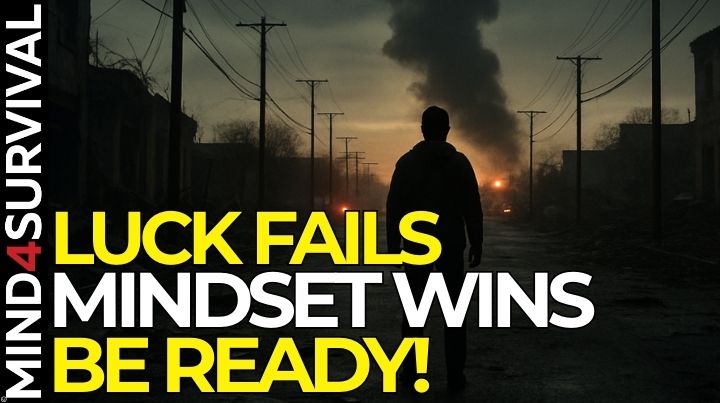Mental Fortitude: 7 Steps to Develop Mental Toughness

Mental fortitude is a necessary part of life for anyone intent on facing and successfully overcoming adversity. Mental toughness allows us to rise to the occasion when doing so is difficult, dangerous, or overwhelming. Likewise, our level of mental fortitude determines if we crack under pressure when the chips are down.
Therefore it's crucial to develop the mental fortitude to face any situation we encounter. Doing so prepares us for the day-to-day challenges of life and the challenges of a world gone mad, which we preppers—when preparing for the Shit to Hit The Fan, are preparing for.
While increasing your mental fortitude isn't easy, nor fast, it is doable with effort, dedication, and a proper preparedness mindset in the form of self-improvement. While gaining new levels of mental toughness may take time, these easy-to-follow steps will help set you on the road to increasing and more self-reliant mental strength.
1. Acknowledge the Situation

One major hurdle I have witnessed repeatedly throughout my decades of experience in positions of high consequence is the inability of many to acknowledge the reality of their situation.
For example, I listened to U.S. Diplomats argue that they did not need security protection while living and working in Peshawar, Pakistan, which was considered the heart of the Taliban at the time. These people failed to acknowledge the gravity of the situation. It was beyond their comprehension that people in the area wanted them dead simply because they were American.
With that, the first step to improving one's mental fortitude is acknowledging the reality of the situation. If you're in an area with high crime, you're more likely to be affected by crime. If you're in a post-disaster zone with rubble and debris strewn everywhere, you'll be more likely to be injured as a result. Similarly, you're more likely to succumb to the effects of lawlessness if you find yourself in an area that has fallen into uncertainty and chaos due to the collapse of civil society.
Does that mean your world will end if you find yourself in a difficult situation? No, it doesn't. What it does mean, though, is that you must acknowledge the situation for what it is. And it's the acknowledgment of the reality of a situation that is the first step to overcoming normalcy bias and opening the door to more effective decision-making, leading to more positive actions on your behalf.
2. Emotional Self-Control

With the gravity of our situation acknowledged, we must focus on our self-control in dealing with the emotional fallout of a crisis. While emotions can be challenging to manage in the moment, if we want to be successful, we must minimize our reactions to our emotions.
“Freaking out” when the world seems to be burning down around us will not help a situation. Likewise, our central nervous system responses of freeze, flight, or fight are emotional responses to the stress of a situation that can hijack our decision-making and subsequent actions, leading us down a path to struggle and self-destruction.
The fact is, emotional hijacking happens along a spectrum from little to no emotional interference in our decision-making to a complete loss of rational decision-making. Where you land on that pathway somewhere between in and out of control depends on your emotional self-control.
My Emotional Control
It also relies on your ability to evaluate and address your level of emotional activation in response to a situation. For example, I recall responding to a horrific auto collision while working in Atlanta as a paramedic many years ago. It was a busy time of day. No backup was coming, and no assistance would arrive.
What I did have was two-critical patients circling the drain, and under conventional wisdom at the time, no way to get them both to the hospital. After all, the school of thought was one critical patient was more than a handful for one paramedic. And it was that school of thought, along with what appeared to be a lack of options, that quickly overwhelmed me and my decision-making.
My Head was Spinning
I could feel my head spinning as my central nervous system (CNS) kicked in and began hijacking my decision-making process by trying to shut me down. As I felt it happening, and it not being my first round in the CNS rodeo, I stopped for a brief couple of seconds, took a deep breath, and reminded myself that it wasn't anytime to meltdown. People's lives depended on me to get it right despite the effects of the human condition.
So, I took a deep breath, reminded myself I got this, refocused, and reset my nervous system. Once I did that, my head stopped spinning, and I felt my overwhelm, fear, and indecision fade away. In its place, with my brain firing on all cylinders again, I told my partner to load them both in the back of the rig and let's haul ass for Grady, the most capable trauma center in the area.
Despite my EMT Basic partner's protests, we loaded the fading fast patients up and headed for Grady. Along the way, I was all assholes and elbows in the back of the bus trying to get my two out-of-option patients stabilized and alive to the hospital. And it worked. They both lived to tell their stories and have a life with their families.
However, what really worked well was my willingness to recognize and call myself out on my overwhelm and loss of emotional control. It was my self-evaluation in the moment that allowed me to self-evaluate and find a way to control my emotions when not doing so would have led to epic failure.
3. Self-Evaluation

Developing mental fortitude includes the acknowledgment of ourselves and our capabilities. Our acknowledgment is based on our ability to examine ourselves and our relationship to our situation with honesty and grace.
It's our honesty that allows us to place our ego aside so that we can genuinely identify our capabilities for addressing our circumstances, no matter how uncomfortable those admissions are. Similarly, it's by offering ourselves the grace to be imperfect humans that provides us a way forward without beating ourselves up or feeling hopeless when facing adversity or opportunity.
This is not to say that examining ourselves is always easy—far from it. However, if we refuse to evaluate ourselves and our capabilities honestly, we will fail at any chance of achieving one of the greatest preps possible—self-improvement.
In the end, if addressed in a positive, dedicated, and mentally resilient manner, today's self-evaluation will lead to tomorrow's strengths and improved capability.
4. Find What Works for You
Just as I did when I was in the eye of overwhelming adversity when dealing with my two critical patients, we must be ready and willing to find a way forward that works. That's because, by the nature of adversity, we can never be sure which direction it's coming from nor what form it will take.
Adversity wouldn't be called adversity if it wasn't uncomfortable, filled with struggle, and unpredictable. Unfortunately for us, adversity is not only filled with uncomfortable struggle, it's a ball pitched to us by the ever-unpredictable Murphy. We simply don't know what form or intensity the challenges of life will show up as.
As such, we must be flexible and open to change in dealing with whatever comes down the path toward us. After all, it's only through flexibility and our willingness to see potential problems from as many angles as possible that we can flex on the fly and address problems as they occur.
With that, the ability to flex on the fly in response to potential and developing situations is best served by not having to create solutions on the fly. In other words, we become more proficient at dealing with adversity through the use of well-thought-out and rehearsed actions. It's by becoming proficient in our planned and trained responses that allow us to use those responses as the basis for any situation we may find ourselves in.
The more efficient our foundational responses are, the easier it will be to be mentally tough and effective in overcoming whatever we encounter.
5. Training-Training-Training
One crucial aspect of developing mental fortitude is training. Whether that training is simply thinking through situations when you have a moment or taking physical and in-person classes, training will help you to observe a situation better and orient to the specifics of what is happening. And finally, make better decisions and actions as a result.
As you probably know, the mind, like your muscles, must be exercised and worked on to ensure peak effectiveness. The more we use our minds and challenge them, the more effective they will become. So, how do we do this?
Well, as I stated, you can take classes and courses that inspire thought and rethinking of how you do things. Similarly and more easily, take the time to think about problems, struggles, and opportunities and how you would handle them.
I suggest writing it down in a journal or on paper. That's because, as crunchy as it sounds, journaling is a great way to not only think thoughts but to have your mind process them to the point of being able to write them on paper. Because writing down our thoughts activates and causes more brain involvement, it helps us to process and consider our ideas more deeply and from other angles.
In my case, writing down my thoughts often opens my mental door to other options I hadn't considered. In so doing, I think of more possibilities and expand my mind in the process. This, in turn, helps me realize other solutions and options that I wouldn't have explored or discovered.
6. Develop a Positive Mindset

One area essential to improving your mental strength is working to achieve a positive mindset. That positive mindset applies not only to the challenges of life but, more importantly, to everyday life.
I say more importantly because a negative mindset in our daily life will bleed over into our mindset when the chips are down—when we're facing adversity. While it may be difficult, maintaining a positive mindset in our daily lives will positively affect us when we find our backs up against the wall.
Maintaining a positive mindset can be challenging, especially in a world full of difficulty and worry. However, while focusing on the positive over the negative is not easy, it is a choice. It's a choice to see the glass as half full or half empty. And yes, when you're in one of life's deep-dark holes, searching for the positive is a monumental effort, and it's a choice nonetheless.
The truth is, dealing with adversity is already tricky enough. Dealing with adversity with a pessimistic, negative mindset only makes the situation worse for all involved. And, when it comes to preparedness, making a situation worse is not part of the formula for success.
7. Pick Yourself Up and Dust Yourself Off
Finally, building your mental fortitude and mental strength also includes the knowledge that you're going to come up short at times. Not everything will always work out, nor work out the way we hope it does.
You are going to have setbacks. We all do! A life without setbacks is a life not lived. Setbacks, failures, and shortcomings are what we use to learn and improve upon. After all, if we do something slightly wrong every day, but it's done well enough to get by, we make mistakes every day. It's only when we make mistakes and learn from them that we will be positioned to be our best.
When, despite your best efforts, you find yourself at your wit's end, screwed up, and struggling, that's the time to double down, dig in, and drive on. Don't give up!
As a former Army Ranger, I've been asked how I made it through selection and into the Ranger Regiment. The answer is simple—I never quit. Whenever the instructors would rain hell down on us, while I wanted to quit, I refused to do so. I picked myself up daily and drove on, and you can too!
The Bottom Line on Developing Your Mental Fortitude
I've realized over decades in EMS, special operations, and providing security in non-permissive environments that we all have an amazing level of mental toughness. We just need to work on tapping into it. Once we do, we all have the ability to be mentally tough people.
As such, it's never too late to develop mental strength. And as I like to say, with the proper mental fitness, there is an Army Ranger, Navy Seal, or Green Beret within each of us. The choice through is yours.
Additional Resources:
- All About Disaster Mindset
- Preparedness Training to Develop Your Mindset
- Do You Have a Self-Defense Mindset? Here’s How to Develop It
- How to Increase Your Everyday Situational Awareness
Stay safe,

Related Articles
FREE Guide
Read the Best Seller
Join Mind4Survival
Stay informed by joining the Mind4Survival! 100% Secure! 0% Spam!
Affiliate Disclosure...
Mind4Survival is a free, reader-supported information resource. If you make a purchase through our link, we may, at no cost to you, receive an affiliate commission.
Do You Want To Be Ready No Matter What?

Download our free 39-page guide with interactive, 7-Day Emergency Kit Checklist and take the first step toward real preparedness.
- Know exactly where to start.
- Save time and money.
- How-to build a complete Basic Emergency Kit.
- Level up your safety and security.
Join Mind4Survival
Stay informed by joining the Mind4Survival! 100% Secure! 0% Spam!






thank you. my glass is always half full and God is always guiding me.
Again you provide some very good advice. with the education provided today by the government, we have too many that believe that only government has the answers. To make things worse, our young believe that our rights are granted by the government it is time to change this. while we see so much of the media using misinformation to support the government and expand its power we must instill in our children that gov. power comes from the citizen not from the laws they write. it won’t be easy to undo so many years of power grabs with so many small steps. we can and we must do it. ————— I, Grampa